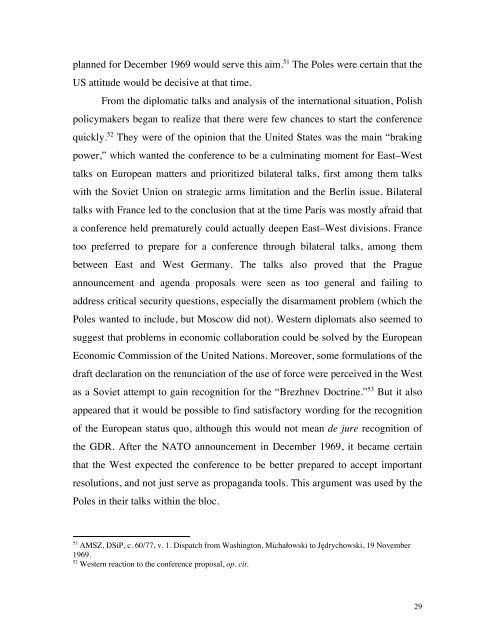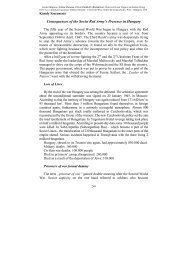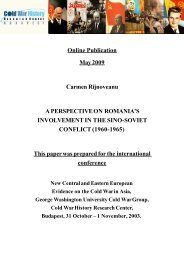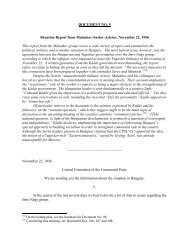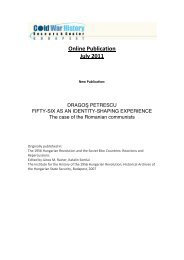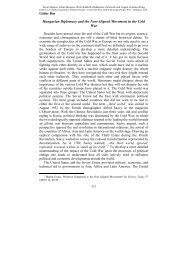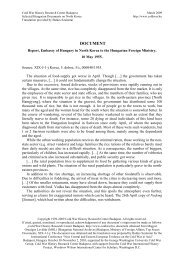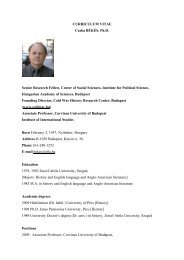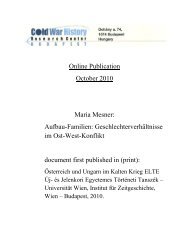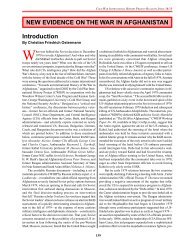Hope and Reality: Poland and the Conference on Security and ...
Hope and Reality: Poland and the Conference on Security and ...
Hope and Reality: Poland and the Conference on Security and ...
You also want an ePaper? Increase the reach of your titles
YUMPU automatically turns print PDFs into web optimized ePapers that Google loves.
planned for December 1969 would serve this aim. 51 The Poles were certain that <str<strong>on</strong>g>the</str<strong>on</strong>g>US attitude would be decisive at that time.From <str<strong>on</strong>g>the</str<strong>on</strong>g> diplomatic talks <str<strong>on</strong>g>and</str<strong>on</strong>g> analysis of <str<strong>on</strong>g>the</str<strong>on</strong>g> internati<strong>on</strong>al situati<strong>on</strong>, Polishpolicymakers began to realize that <str<strong>on</strong>g>the</str<strong>on</strong>g>re were few chances to start <str<strong>on</strong>g>the</str<strong>on</strong>g> c<strong>on</strong>ferencequickly. 52 They were of <str<strong>on</strong>g>the</str<strong>on</strong>g> opini<strong>on</strong> that <str<strong>on</strong>g>the</str<strong>on</strong>g> United States was <str<strong>on</strong>g>the</str<strong>on</strong>g> main “brakingpower,” which wanted <str<strong>on</strong>g>the</str<strong>on</strong>g> c<strong>on</strong>ference to be a culminating moment for East–Westtalks <strong>on</strong> European matters <str<strong>on</strong>g>and</str<strong>on</strong>g> prioritized bilateral talks, first am<strong>on</strong>g <str<strong>on</strong>g>the</str<strong>on</strong>g>m talkswith <str<strong>on</strong>g>the</str<strong>on</strong>g> Soviet Uni<strong>on</strong> <strong>on</strong> strategic arms limitati<strong>on</strong> <str<strong>on</strong>g>and</str<strong>on</strong>g> <str<strong>on</strong>g>the</str<strong>on</strong>g> Berlin issue. Bilateraltalks with France led to <str<strong>on</strong>g>the</str<strong>on</strong>g> c<strong>on</strong>clusi<strong>on</strong> that at <str<strong>on</strong>g>the</str<strong>on</strong>g> time Paris was mostly afraid thata c<strong>on</strong>ference held prematurely could actually deepen East–West divisi<strong>on</strong>s. Francetoo preferred to prepare for a c<strong>on</strong>ference through bilateral talks, am<strong>on</strong>g <str<strong>on</strong>g>the</str<strong>on</strong>g>mbetween East <str<strong>on</strong>g>and</str<strong>on</strong>g> West Germany. The talks also proved that <str<strong>on</strong>g>the</str<strong>on</strong>g> Pragueannouncement <str<strong>on</strong>g>and</str<strong>on</strong>g> agenda proposals were seen as too general <str<strong>on</strong>g>and</str<strong>on</strong>g> failing toaddress critical security questi<strong>on</strong>s, especially <str<strong>on</strong>g>the</str<strong>on</strong>g> disarmament problem (which <str<strong>on</strong>g>the</str<strong>on</strong>g>Poles wanted to include, but Moscow did not). Western diplomats also seemed tosuggest that problems in ec<strong>on</strong>omic collaborati<strong>on</strong> could be solved by <str<strong>on</strong>g>the</str<strong>on</strong>g> EuropeanEc<strong>on</strong>omic Commissi<strong>on</strong> of <str<strong>on</strong>g>the</str<strong>on</strong>g> United Nati<strong>on</strong>s. Moreover, some formulati<strong>on</strong>s of <str<strong>on</strong>g>the</str<strong>on</strong>g>draft declarati<strong>on</strong> <strong>on</strong> <str<strong>on</strong>g>the</str<strong>on</strong>g> renunciati<strong>on</strong> of <str<strong>on</strong>g>the</str<strong>on</strong>g> use of force were perceived in <str<strong>on</strong>g>the</str<strong>on</strong>g> Westas a Soviet attempt to gain recogniti<strong>on</strong> for <str<strong>on</strong>g>the</str<strong>on</strong>g> “Brezhnev Doctrine.” 53 But it alsoappeared that it would be possible to find satisfactory wording for <str<strong>on</strong>g>the</str<strong>on</strong>g> recogniti<strong>on</strong>of <str<strong>on</strong>g>the</str<strong>on</strong>g> European status quo, although this would not mean de jure recogniti<strong>on</strong> of<str<strong>on</strong>g>the</str<strong>on</strong>g> GDR. After <str<strong>on</strong>g>the</str<strong>on</strong>g> NATO announcement in December 1969, it became certainthat <str<strong>on</strong>g>the</str<strong>on</strong>g> West expected <str<strong>on</strong>g>the</str<strong>on</strong>g> c<strong>on</strong>ference to be better prepared to accept importantresoluti<strong>on</strong>s, <str<strong>on</strong>g>and</str<strong>on</strong>g> not just serve as propag<str<strong>on</strong>g>and</str<strong>on</strong>g>a tools. This argument was used by <str<strong>on</strong>g>the</str<strong>on</strong>g>Poles in <str<strong>on</strong>g>the</str<strong>on</strong>g>ir talks within <str<strong>on</strong>g>the</str<strong>on</strong>g> bloc.51 AMSZ, DSiP, c. 60/77, v. 1. Dispatch from Washingt<strong>on</strong>, Michałowski to Jędrychowski, 19 November1969.52 Western reacti<strong>on</strong> to <str<strong>on</strong>g>the</str<strong>on</strong>g> c<strong>on</strong>ference proposal, op. cit.29


